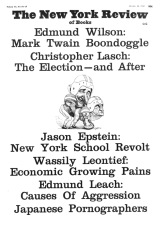NOTE: Iosip Brodsky is now twenty-eight. Both his writing and his political status have made him a striking representative of the younger Russian poets. His arrest, in February 1964, and his trial and sentence (to five years of hard labor above the Arctic Circle) have been reported in some detail in the Western press. The proceedings against him under charge of “social parasitism”—meaning that he had made a precarious living by translating poetry and not had a sufficiently continuous or lucrative employment to satisfy some of the devotees of his own society’s law and order—can be regarded as one of the early minor triumphs in the wave of anti-intellectualism and hawkish repression that by now boasts a grim series of writers’ trials and the invasion of Czechoslovakia. He was released in fact after serving less than two years of his sentence—a circumstance that does some honor either to his captors or to certain of the pressures on them. He is said to have declared that he enjoyed his stay in the country living among peasants—an assertion that does credit to his own wit.
When he was arrested he was not a member of the Writers Union, which not only prevented him from having published a book, but proved, in the view of his judge, that he was not a poet at all. “Who included you among the ranks of the poets?” she asked him, at one point during his hearings. “No one,” he answered, adding, “And who included me among the ranks of the human race?” The judge asked if he had studied to be a poet, and he answered “I didn’t think you could get this from school.” Where then did it come from? His reply, in the 1960s, would have startled other courts than that of Judge Savalieva. He said, “I think that it…comes from God.”
At the time he was already well known in Russian literary circles. His poems had circulated in manuscripts and been read at poetry readings. After his trial a volume of his poems was smuggled out of Russia and published both in Russian and in a French translation. The difference between his poetry and that of others of his generation such as Yevtushenko and Voznesensky is at once apparent. He declares—with what arrogance one can imagine in Russia—that he is a conservative. He reads and translates English and his favorite modern American poet, he says, is Robinson. And he is consciously a St. Petersburg poet, in the tradition of Akhmatova, when most of his other internationally known contemporaries come from the Moscow literary scene. Rumors of a new collection of poems, ready or nearly ready for publication, have reached the West, but not the poems themselves, or at least not in any publicly available form.
—W. S. Merwin
THE JEWISH CEMETERY
The Jewish Cemetery near Leningrad
a lame fence of rotten planks
and lying behind it side by side
lawyers, businessmen, musicians, revolutionaries.
They sang for themselves,
got rich for themselves,
died for others.
But always paid their taxes first;
heeded the constabulary,
and in this inescapably material world
studied the Talmud,
remained idealists.
Maybe they saw something more,
maybe believed blindly.
In any case they taught their children
tolerance. But
obstinacy. They
sowed no wheat,
never sowed wheat,
simply lay down in the earth
like grain
and fell asleep forever.
Earth was heaped over them,
candles were lit for them,
and on their day of the dead raw voices of famished
old men, the cold at their throats,
shrieked at them, “Eternal peace!”
Which they have found
in the disintegration of matter,
remembering nothing
forgetting nothing
behind the lame fence of rotten planks
four kilometers past the streetcar terminal.
THE VERBS
In the silence the verbs surround me
like faces of strangers,
the verbs,
famished verbs, naked verbs,
essential verbs, deaf verbs,
verbs with no names, mere verbs,
verbs that live in caves,
speak in caves,
under the shifting levels
of the universal optimism.
They go to work every morning,
mix cement, haul stones,
build the city…No, they erect
a monument to their own solitude.
They recede as we disappear in the memory
of someone else, they keep in step beside words,
and with their three tenses in line,
the verbs climb the hill Golgotha.
The sky is above them
like a bird above a cemetery.
They stand upright
as though in front of a closed door
and a man lifts his arms and drives nails
into the past
into the present
into the future.
No one will ever come to bear witness.
The strokes of the hammer
become the rhythm of eternity.
Under the verbs stretches the hyperbole, earth,
and heaven, the metaphor, drifts above them.
THE MONUMENT
Let us set up a monument
in the city, at the end of the long avenue,
or at the center of the big square,
a monument
that will stand out against any background
because it will be
quite well made and very realistic.
Let us set up a monument
that will not disturb anybody.
We will plant flowers
around the pedestal
and with the permission of the city fathers
we will lay out a little garden
where our children
will blink
at the great orange sun
and take the figure perched above them
for a well-known thinker
a composer
or a general.
I guarantee that flowers will appear
every morning
on the pedestal.
Let us set up a monument
that will not disturb anybody.
Even taxi drivers
will admire its majestic silhouette.
The garden will be a place
for rendez-vous.
Let us set up a monument,
we will pass by it
hurrying on our way to work,
foreigners will have their pictures taken
standing under it,
we will splash it at night with the glare
of floodlights.
Let us set up a monument to The Lie.
This Issue
October 10, 1968



